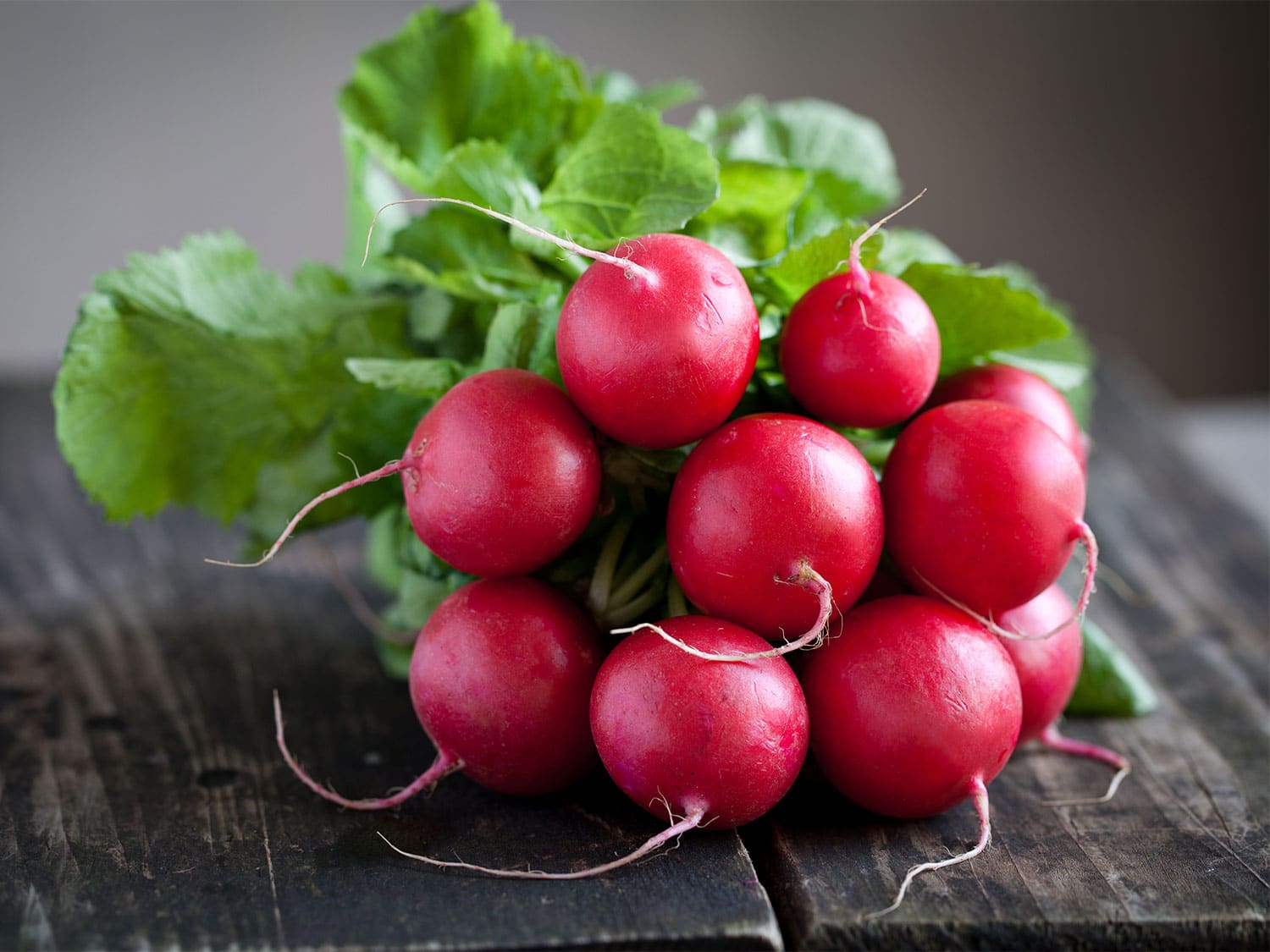Radish, a pungent, slightly sweet, and juicy root vegetable has a special place in the hearts of veggie lovers. Belonging to the Brassica family, radish comes in several shapes, sizes and colors, which include black, red, purple and of course, white. The culinary uses of radish are well known, but are you aware of its medicinal and health benefits?
The culinary uses of radish are well known, but are you aware of its medicinal and health benefits?

Nutritional Value Of Radish
100 grams serving of radish will provide your body with good amounts of folate, riboflavin, fiber, vitamins, copper, manganese and magnesium. It has detoxifying agents like indoles, and flavonoids like beta-carotene, lutein, and zeaxanthin. It even contains calcium, though not in huge amount. Below is the complete nutritional value of 100 grams radish.
| Calories 16 | |
| % Daily Value* | |
| Total Fat 0.1 g | 0% |
| Saturated fat 0 g | 0% |
| Polyunsaturated fat 0 g | |
| Monounsaturated fat 0 g | |
| Cholesterol 0 mg | 0% |
| Sodium 39 mg | 1% |
| Potassium 233 mg | 6% |
| Total Carbohydrate 3.4 g | 1% |
| Dietary fiber 1.6 g | 6% |
| Sugar 1.9 g | |
| Protein 0.7 g | 1% |
| Vitamin A | 0% | Vitamin C | 24% |
| Calcium | 2% | Iron | 1% |
| Vitamin D | 0% | Vitamin B-6 | 5% |
| Vitamin B-12 | 0% | Magnesium | 2% |
Health Benefits Of Radish
1. Radish Is A Rich Source Of Vitamin C
Radish is an excellent source of vitamin C, a nutrient which rebuilds the blood vessels and tissues and keeps the teeth and bones strong. Vitamin C even improves the immunity, thereby protecting the body from the destruction caused due to free radicals. A single serving of radish can give you 17.2 milligrams of vitamin C, which is around 29 percent of the daily recommended amount.
2. Keeps The System Clean
The high levels of fiber in it bulk up the stool and ease its passage, thereby keeping the system clean and functioning. Being a natural diuretic, radish can purify the urinary system and kidney, relieving inflammation. Since it is a naturally hot vegetable, it can even put an end to the burning sensation experienced while urinating. Furthermore, radish supplies fresh oxygen to the blood, inhibiting the red blood damage.
3. A Perfect Remedy For Bilirubin And Jaundice
Bilirubin is a condition, which gives a yellow tinge to the skin, eyes and mucous membranes, particularly in newborns. It’s a type of jaundice, which occurs when bilirubin grows in the bile faster than the liver can break it down and pass it through the body. Radish, especially black radish and its leaves are known to perform excellent detoxification. It even checks the red blood cell loss, which is caused by jaundice. But please consult a doctor before giving radish to infants.
4. Provides Relief From Osteoarthritis
Vitamin C in radish helps in making collagen, a protein which makes up cartilage in the body. A regular consumption of radish will even prevent damage to the cartilage caused due to free radicals. This is beneficial for those diagnosed with arthritis.
5. Helps In Weight Management
As mentioned above, it is a fine source of fiber and keeps you full for a longer period, thereby preventing overeating. It’s even high in water and low in calories, making it a great option for anyone trying to lose weight.
6. Heart Health
Radish contains anthocyanin, a type of flavonoid, which can reduce the risk of cardiovascular diseases. Anthocyanin is required for circulating metabolites, a process which protects the heart from oxidative stress. The anti-inflammatory properties of radish lessen the possibility of peripheral artery disease and even heart failure.
7. Skin Health
Nutrients like zinc, phosphorus, vitamin C and B complex vitamins in it can expedite healing of the skin. It can help in the treatment of cracked skin and even ecchymosis. Besides, radish is a water rich veggie so that it will provide much-needed hydration to the skin. And its antibacterial properties will heal cracked skin and prevent any kind of infection.
Safety Profile
Radishes are safe for consumption, but if you develop any sort of allergic reaction or rashes, stop consuming it immediately and consult a doctor.
Also, eating loads of it can irritate the digestive tract, especially of those who have gallstones. So avoid it altogether if you have a sensitive stomach.
Storage Of Radish
Before refrigerating this veggie, ensure that you wash it properly and remove the greens from its top. It will enhance its longevity. You can even put sliced radishes in a plastic bag with a paper towel at the bottom. It will keep it fresh for at least a week.
You don’t have to consume 5 or 10 large radishes to obtain the health benefits. Just a 100 grams serving will provide you with all the nutritional value.
So when are you planning to introduce radish in your diet?
image: source

